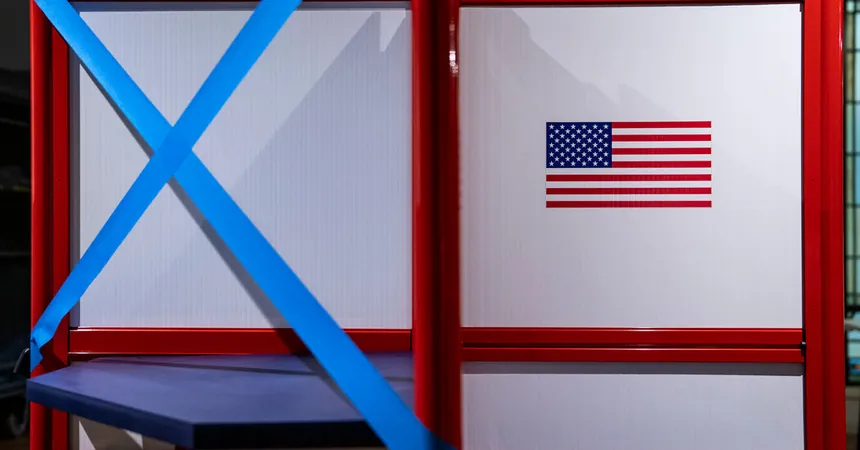
Foreign Powers Intensify Efforts to Undermine U.S. Election Integrity, Warn Officials
2024-10-08
Author: Ying
Foreign Influence Campaigns Intensifying
As the U.S. gears up for another pivotal election, intelligence officials have raised alarming concerns about ongoing foreign influence campaigns aimed at destabilizing American democratic processes. In an urgent update released on Monday, officials indicated that adversaries—including Russia, China, and Iran—are preparing to propagate false claims regarding the legitimacy of election results following the polls' closure on Election Day.
According to these experts, the anticipated close presidential race and potential controversies over control of the Senate and House of Representatives provide fertile ground for foreign actors to exploit existing tensions and doubts about election integrity. This warning comes just a month before voters head to the polls, underscoring the significant threats posed by nations that seek to undermine trust in democratic institutions.
Exploitation of Domestic Tensions
The intelligence brief revealed that these foreign antagonists are not only expected to amplify domestic apprehensions about voting irregularities but may also fabricate their own allegations. Following the controversial 2020 election, former President Donald Trump and his supporters propagated baseless claims of voter fraud, an approach that has resurfaced in the current electoral climate, mirroring narratives echoed by Kremlin-affiliated media outlets.
Diverse Foreign Interests
Officials from the Office of the Director of National Intelligence highlighted a troubling trend: foreign influence actors are likely to employ tactics to sow doubt about electoral outcomes, exacerbating divisions among Americans. Notably, while Russia appears to favor Trump, Iran has expressed support for Vice President Kamala Harris, contrasting their strategic interests across the election's political landscape.
In addition to these two rivals, the repercussions of foreign involvement extend to a broader array of nations. China, for instance, is believed to have interfered in numerous congressional races without favoring either party specifically, targeting candidates who strongly advocate for Taiwan. Similarly, Cuba could engage in influence efforts aimed at specific candidates, continuing its historical focus on the U.S. economic embargo and its attempts to connect with the Latin American and Spanish-speaking communities in the U.S.
Concerns Over Election Legitimacy
The analysis also pointed out that while Russia has predominantly supported candidates skeptical about aiding Ukraine, Iran's influence strategy has included creating threatening content directed at election officials rather than focusing on congressional races.
As the election cycle enters its final weeks, lawmakers have expressed heightened concerns that this period will see intensified foreign efforts to challenge the legitimacy of the electoral process, potentially impacting public confidence. Given the decentralized nature of U.S. voting, foreign powers recognize that altering vote counts through hacking is a daunting task. Instead, they aim to engage in "perception hacking," spreading disinformation about flaws in the election process to induce skepticism among the electorate.
Warnings from Federal Agencies
Highlighting these threats, the FBI and the Cybersecurity and Infrastructure Security Agency recently released a public service announcement warning about the likelihood of foreign governments attempting to disseminate fictitious claims related to ransomware attacks and other hacking incidents that could affect vote counting.
The Impact of Social Media
Furthermore, Senator Mark Kelly of Arizona revealed troubling statistics regarding the influence of foreign-origin political content saturating American social media. According to Kelly, there is a significant chance—between 20 to 30 percent—that such content originates from nations like Russia, Iran, or China, indicating a growing sophistication in how these countries disguise their disinformation as local discourse.
Financial Investments in Disinformation
In recent months, investigative efforts by the Justice Department uncovered that Russia had covertly invested $10 million to amplify pro-Kremlin narratives featuring influential conservative commentators. This strategy includes utilizing both willing and unwitting American figures to disseminate disinformation through various platforms and outlets.
Iran, too, has been identified as using multiple websites masquerading as American news sources to spread misleading information. One such site, falsely claiming an endorsement from a former Republican congressman, has been particularly contentious, promoting narratives of rampant election fraud while predicting an overwhelming Republican victory.
Urgent Need for Vigilance
As foreign adversaries continue to engage in activities aimed at undermining the fundamental tenets of U.S. democracy, experts stress the urgent need for vigilance. Max Lesser of the Foundation for the Defense of Democracies warns of the enduring vulnerability of the U.S. electoral system to such external threats, noting, "America's adversaries are seeking to cast doubt on the very value of democratic processes because America's most enduring asset is the strength of its democracy."
This election year is shaping up to be one of the most contentious in recent history, with foreign influence efforts poised to complicate an already polarized political landscape. As Election Day approaches, the need for heightened awareness and preparedness has never been more critical.

 Brasil (PT)
Brasil (PT)
 Canada (EN)
Canada (EN)
 Chile (ES)
Chile (ES)
 España (ES)
España (ES)
 France (FR)
France (FR)
 Hong Kong (EN)
Hong Kong (EN)
 Italia (IT)
Italia (IT)
 日本 (JA)
日本 (JA)
 Magyarország (HU)
Magyarország (HU)
 Norge (NO)
Norge (NO)
 Polska (PL)
Polska (PL)
 Schweiz (DE)
Schweiz (DE)
 Singapore (EN)
Singapore (EN)
 Sverige (SV)
Sverige (SV)
 Suomi (FI)
Suomi (FI)
 Türkiye (TR)
Türkiye (TR)